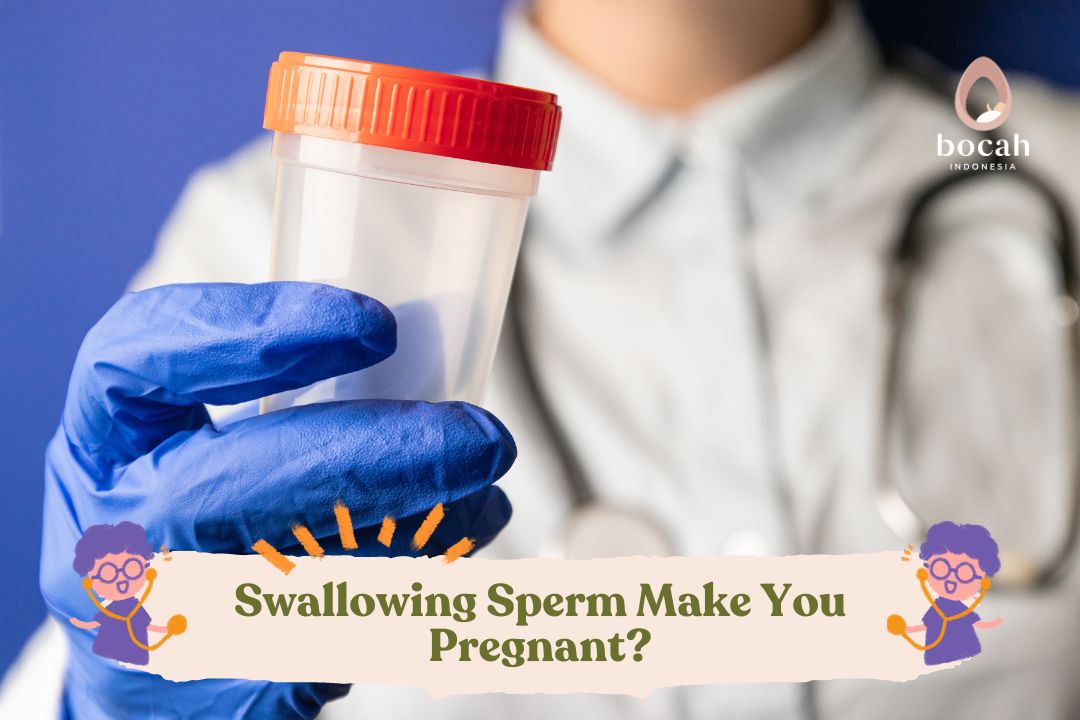Can Swallowing Sperm Make You Pregnant?

Rather than getting pregnant, swallowing sperm can actually pose health risks. Read the following explanation.
Sperm plays a crucial role in fertilization. It travels from the cervix to the fallopian tubes to meet the egg for fertilization. However, you may often hear questions about whether swallowing sperm can lead to pregnancy? Of course, this is just a myth, Mom.
Can Swallowing Sperm Lead to Pregnancy?
Essentially, sperm is contained in semen and is not visible to the naked eye. Therefore, what is swallowed is semen containing sperm. Sperm is produced by the testicles with the help of male reproductive hormones and is released along with semen during ejaculation.
Sexual intercourse has various variations depending on each couple, including oral sex. This condition occurs for couples who want to increase sexual arousal in their relationship. For couples who engage in sexual variations like this, it’s possible that they may swallow semen containing sperm during ejaculation.
However, many wonder if swallowing sperm will lead to pregnancy? In reality, swallowed sperm does not result in the partner getting pregnant. This is because the sperm enters the digestive system and cannot cause pregnancy.
Tanya Mincah tentang Promil?
To achieve pregnancy, sperm cells must meet an egg, which can occur through sexual intercourse, not oral sex. So, if sperm is swallowed during oral sex, it cannot lead to pregnancy, Mom.
According to Dr. Gito Wasian, Sp.And, an andrology specialist at Bocah Indonesia, states that swallowing semen containing sperm does not affect pregnancy. Rather, it can pose certain risks.
“Indeed. Swallowing semen containing sperm does not cause pregnancy but can lead to allergy risks or sexually transmitted infections transmitted through oral sex,” says Dr. Gito.
Health Risks of Swallowing Sperm
Rather than causing pregnancy, swallowing semen containing sperm can pose several health risks, such as:
-
Sperm allergy
It’s important to know that swallowing sperm through oral sex can pose a risk of an allergic reaction. This condition occurs if a person is allergic to the proteins in sperm. Some possible allergic reactions include itching, skin rashes, swelling, pain, and difficulty breathing.
This allergy might occur 20-30 minutes after swallowing sperm. Although rare, Mom should be cautious as this condition can occur.
-
Sexually Transmitted Infections (STIs)
In addition to sperm allergies, another risk of swallowing sperm is sexually transmitted infections (STIs). This is because some sexually transmitted viruses can be spread through bodily fluids from an infected person, such as:
-
Human immunodeficiency virus (HIV)
-
Human papillomavirus (HPV)
-
Chlamydia
-
Gonorrhea
-
Herpes
The risk of transmitting these viruses can increase if there are open wounds in the mouth, such as bleeding gums or gingivitis. Essentially, the transmission of these sexual viruses can occur even through oral intercourse.
Conclusion
Mom and Dad, swallowing sperm indeed cannot lead to pregnancy. However, this sexual variation is not recommended due to the risk of transmitting sexual infections. Even oral sex involving the anus can transmit hepatitis A and B. If this occurs, it can also transmit intestinal parasites such as Giardia and bacteria like E. coli and Shigella.
If Mom and Dad wish to get pregnant quickly, it is not advised to engage in oral sexual variations as it does not help in achieving pregnancy. Remember to undergo fertility checks at a fertility clinic if Mom and Dad have not conceived after one year of marriage and sexual intercourse without contraception.
Source:
- Kedzior, S.G.E., et al. (2019). It takes a community to conceive: an analysis of the scope, nature, and accuracy of online sources of health information for couples trying to conceive. Reprod Biomed Soc Online. 2019 Oct 5:9:48-63.
- Centers for Disease Control and Prevention. STD Risk and Oral Sex.
- Saini, R., et al. (2010). Oral Sex, Oral Health and Orogenital Infections. J Glob Infect Dis. 2010 Jan-Apr; 2(1): 57–62.











2 Responses
A 15 year old girl got pregnant after oral sex and it was published in a journal. If you would have googled the data available you would have answered correctly. It is possible to get pregnant after oral sex because it happened once already. The probability is very low. In this case the girl was stabbed right after oral sex and some sperm leaked into her abdominal cavity and somehow it got to the uterus. She didn’t even have a vagina and had other abnormalities. So the correct answer is that the probability is extremely low of getting pregnant after oral sex but not zero.
Thank you for your feedback and for providing this specific case study. You are correct; while the probability is exceptionally low, cases of conception under highly unusual circumstances have been documented in medical literature. The key takeaway is that such a scenario is an extreme outlier and not a representation of general medical understanding.
Thank you again for contributing this valuable information.